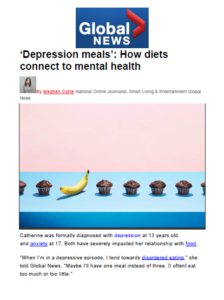Some people (an estimated 48%) eat less when depressed; other people (an estimated 35%) eat more when depressed (Maxwell et al., 2009). Reward regions within the brain appear hyperactive among depressed over-eaters and insular regions within the brain appear hypoactive among depressed under-eaters (Simmons et al., 2016). Dr. Simon Sherry discussed the food-mood connection with Global News’ Meghan Collie, including links between eating disorders and mood disorders. Click here to read more.
